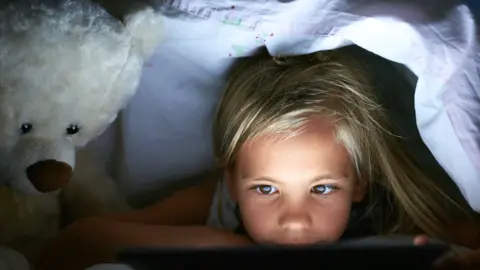Children's screen time has little effect on sleep, says study
 Getty Images
Getty ImagesThe amount of time children spend on devices has little effect on how long they sleep, a study from Oxford University suggests.
It runs counter to previous research that suggested excessive screen time was linked to children failing to get sufficient rest.
The survey concluded that the relationship between sleep and screen use in children was "extremely modest".
But one UK GP said the findings did not tally with his clinical experience.
The study, conducted by the Oxford Internet Institute, relied on data from a 2016 US study into children's health, in which parents from across the country completed surveys about their households.
The children's "digital screen time" was based on answers to two questions about the weekday habits of children aged between six months and 17 years:
- how much time they spent on computers, mobile phones, handheld video games and other electronic devices
- how much time they spent in front of a TV watching programmes and other content as well as playing video games
The findings indicate that the tech-abstaining teenagers slept only slightly longer than their counterparts who had spent much of their day in front of a screen.
For example, teenagers who had not been in front of a screen for any part of the day got a total of eight hours and 51 minutes of sleep.
Those who had spent eight hours of their day glued to a screen got eight hours and 21 minutes of slumber.
The sample size for the survey was more than 50,000 youngsters from every state in the US.
'Mini case of jet lag'
The study, published in the Journal of Pediatrics, said every hour of screen time was linked to between three to eight fewer minutes of sleep a night.
Screens are now a fixture of modern childhood and both professionals and parents are increasingly expressing concerns that the amount of time children devote to devices affects their physical and mental health.
When it comes to sleep, there are concerns that children take devices to bed and continue to use them when they should be sleeping.
Others have expressed worries about the role the blue light emitted from such devices plays on sleep habits and a related hormone.
The US National Sleep Foundation has told parents that it is important to stop children using electronic devices before bedtime "because the blue light emitted from these screens can delay the release of sleep-inducing melatonin".
"This is an especially big problem for teens whose circadian rhythms are already shifting naturally, causing them to feel awake later at night. The end result: sleep-deprived or poorly rested kids who have essentially given themselves a mini case of jet lag," it writes on its website.
'Imperfect data'
But the study author thinks other factors should be considered.
"Focusing on bedtime routines and regular patterns of sleep, such as consistent wake-up times, are much more effective strategies for helping young people sleep than thinking screens themselves play a significant role," said study author Prof Andrew Przbylski.
Prof Przbylski told the BBC that many of the studies suggesting links between screen time and lack of sleep had very small sample sizes and need "much larger studies" to find conclusive evidence of a problem.
"Because the effects of screens are so modest, it is possible that many studies with smaller sample sizes could be false positives - results that support an effect that in reality does not exist," he said.
He acknowledged that the data used in the study was "imperfect" because it relied on reports from parents. A further study into the time that children turn off their devices before bedtime will be published shortly.
Many of the large technology firms, including Apple, Google and Facebook, have introduced dashboards allowing people to keep a check on the amount of time they spend on screens.
Some leading technology executives have banned their own children from using devices.
The late Apple chief Steve Jobs's young children were notably not allowed iPads.
Microsoft co-founder Bill Gates banned phones until his children were teenagers.
And Tim Cook, Apple's current leader, has said he would not let his nephew join social networks.
One UK GP, Rangan Chatterjee, said the Oxford University study was "welcome" but that he did not plan to change his advice to parents, which was to turn off devices an hour before bedtime.
"The more research on this area, the better because screens are here to stay," he told the BBC.
"But the findings don't replicate what I see in clinical practice which is that the use of screens right before bed has a significant impact on the quality of sleep."
